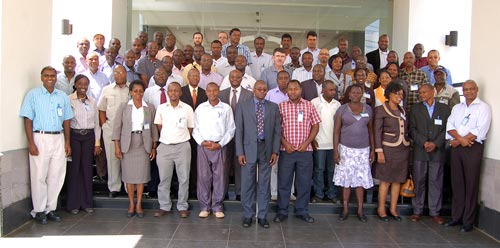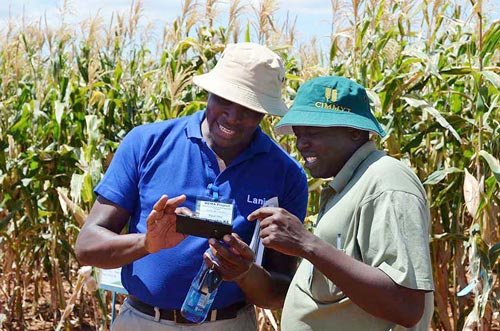By Michael Arunga/CIMMYT
Informative presentations, lively discussions and a research station field trip were highlights of a Water Efficient Maize for Africa (WEMA) course on maize seed production and management held last week in Nairobi.

The two-day course targeted seed companies that will commercialize drought-tolerant maize hybrids from the WEMA project. Seed company representatives were accompanied by the WEMA Product Deployment Team (DEPT) and members of WEMA partner countries (Kenya, Mozambique, South Africa, Tanzania and Uganda). Representatives from CIMMYT, Monsanto, the African Agricultural Technology Foundation (AATF), the African Seed Trade Association (AFSTA) and a member of the National Agricultural Research Organisation Board of Trustees attended.
The African Agricultural Technology Foundation (AATF)-led WEMA DEPT team and CIMMYT organized the course. During the plenary session, seed experts – including John MacRobert and Mosisa Regassa from CIMMYT and Jonga Munyaradzi from AATF – presented on hybrid seed production, distinguishing characteristics of inbred lines, certification standards and inspection procedures, quality assurance procedures and stewardship. William Munyao, an inspector at the Kenya Plant Health Inspectorate Service, explained why standards and inspection are crucial to achieve credibility.

Participants raised concerns about the slow implementation of maize seed regulatory standards by regional bodies such as the Economic Community of West Africa States, the East Africa Community and the Common Market for Eastern and Southern Africa. Seed companies said they want to see these standards implemented as soon as possible because they will give farmers greater access to improved varieties. After the plenary session, CIMMYT hosted participants on a visit to the KARI-CIMMYT Kiboko Crops Research Station. Stephen Mugo, Yoseph Beyene and Kiru Pillay led the tour, during which participants had the opportunity to evaluate selected hybrids and lines from demonstration plots. More than 50 hybrids are being grown under managed drought stress and optimal conditions.
The hybrids are in their first or second year of national performance trials in Kenya, Mozambique, South Africa, Tanzania and Uganda. The participants also visited the recently-developed doubled haploid (DH) lines in a seed increase nursery. Sotero Bumagat, the CIMMYT DH manager, led participants on a tour of the newly-commissioned DH facility. James Karanja and Regina Tende presented insect-protected confined field trials. MacRobert, a CIMMYT expert in seed production and management, told participants to embrace realistic approaches when producing seed. He emphasized the importance of hiring skilled personnel who have a genuine interest in seed production. “Emphasis should not be entirely on academia,” MacRobert said. “We should not insist on diploma, undergraduate, master’s or even doctorate degrees as prerequisites for hiring a productive worker. A farm hand who does not have these qualifications but has excellent seed production experience may be an excellent employee.”
 Capacity development
Capacity development